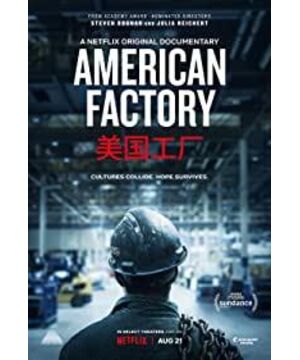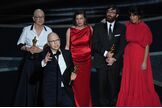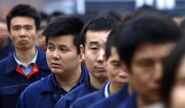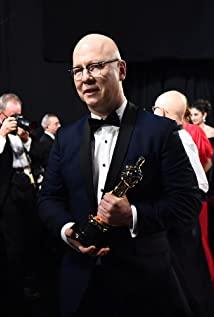"American Factory", as the best documentary feature at the 2020 Oscars, has been included in the "want to see" list for a long time. Just finished watching it today. The original story is about the Chinese glass king opening a factory in the United States. Due to work reasons, Cao Dewang and I were very close for a while. We lived at his house, traveled with him on business trips, and chatted with him for hours every day. As a bold entrepreneur and a sharp social observer, as well as a man with a kind heart, I learned something.
The film tells the story of Cao Dewang's Fuyao Group opening a factory in the United States. He acquired a bankrupt General Motors factory, transformed it into an automotive glass production plant, exported Chinese management experience, hired local employees in the United States, and engaged in automotive glass production. This has created a "splendid" case for Chinese manufacturing to enter the United States.
The documentary team followed the filming for three years, recording the factory's acquisition, the completion of the production line, and the struggle for the establishment of a "union" by American workers for greater rights... The problems faced by a Chinese company in the United States were collected into in the film.
Cao Dewang is a wise entrepreneur. Although he is a Chinese "bunker", he understands the stakes. For example, when managers asked him if he was flying both the Chinese and American flags at the factory, he said, don't fly the Chinese flag, so as not to "irritate" American workers. It's a form of empathy. People without empathy don't manage well. At the same time, when a local congressman actively advocated the establishment of a "union" in Fuyao, he clearly stated that if the union is established, he will withdraw from the United States, because that will lead to inefficiency of the factory, and ultimately hurt both the investors and the workers. Benefit.
Moreover, when the workers in the factory could not bear the pressure of China's efficiency requirements and ran for their rights and organized a vote on the establishment of a labor union, Cao Dewang spent another $1 million to hire an influential intermediary company to intervene, and finally successfully persuaded most of the workers. Vote against, deadly union plan aborted.
In 2016, the US factory opened. The information at the end of the film shows that in 2018, the factory began to realize profitability. Meanwhile, a worker died in an accident on the job. Previously, U.S. workers' representatives repeatedly asked the factory to improve the suitability and safety of the production environment, which did not receive enough attention.
At first glance, this is a capitalist story.
A story of how a Chinese capitalist organized production resources in the United States, hired American workers, and satisfied the American market.
Capitalists are "cruel". For profit and production efficiency, they desperately squeeze workers, demanding more working hours and higher post efficiency. Those who are incompetent are eliminated. Those who campaigned for labor rights have also faced retaliatory actions from being laid off.
At the same time, it is a paradox.
The capitalist system does not breed lazy people. When the efficiency of some workers cannot be improved, they will be replaced by those with higher efficiency. When some workers demand that the factory meet their greater rights and interests, those who can work with peace of mind without raising similar requirements become the ones who can keep their jobs. people.
This seems to be the "involution" that is currently hotly debated in China.
When traditional manufacturing is in crisis, it's a blessing to have a bite to eat. In this way, the big boss from China, Cao Dewang, is simply a bodhisattva.
But American workers are not Chinese workers. Fighting for legitimate rights and interests is the right granted to them by law.
Therefore, the labor union dispute was once fierce in Fuyao's American factory, which became a crisis moment for Cao Dewang's investment in the United States.
In the end, however, the will of capital prevailed.
And the further down the road, the more vulnerable workers will be. Because of the automation upgrade of robots and production lines, jobs are being eliminated naturally.
What do you want people to do when machines are so much more efficient than people?
What do you want people to do when they can't function like machines?
So this documentary, from a certain perspective, records the victory of Chinese capitalist Cao Dewang in the US manufacturing industry.
In my opinion, it is not surprising that this kind of victory happened to Cao Dewang. Because he is indeed an entrepreneur with a deep understanding of human nature and a domineering style.
Sometimes, even to the point of magic.
This can be found in the numerous entrepreneurial stories he told me in the dozen or so long conversations I had with him before.
Even in the documentary, there is also a "magical" detail. When the grand opening ceremony was to be held in a few months, the head of the factory's American construction suggested that he should build a cover above the rostrum to prevent it from happening. rain. Cao Dewang said directly: "No need to build. It won't rain then." The Yankee's expression could be described as jaw-dropping after hearing the answer informed by the translator. In fact, on the day of the opening ceremony a few months later, the sun was shining brightly. Even the Yankee said: "Our Chairman Cao has planned the weather for a long time!"
The Cao Dewang in the documentary is just as wise and miraculous as what I saw in reality a few years ago.
Cao Dewang, among the dozens of boss-level entrepreneurs I have interviewed, is one of the very few people I admire.
He is a charismatic, profound man. In this land of China, he has a domineering style of work and a flamboyant personality. He is an evergreen tree in the corporate world. His automotive glass became the world's No. 1 brand ten years ago, with a market share of 70%.
However, watching this documentary, I have a different perception.
The video shows a group of Americans visiting Fuyao headquarters in China. It reveals some of the essence of the "Chinese miracle" embodied by Fuyao. Chinese workers work 12 hours a day and only have one day off a month. How many workers have left their homes and have long been the "spikes" of their production lines. This is the foundation of their miracles. In contrast, U.S. workers have eight days off a month, eight hours a day legally, and are reluctant to work overtime. Comparing the two, the difference is huge.
The Fuyao Chinese factory shown in the same documentary is very different from the Fuyao American factory. The workers in the American factory, on the one hand, thanked Fuyao for the job opportunity, but on the other hand, they constantly criticized the working conditions and excessive work pressure. The workers, with low eyebrows and pleasing eyes, bowed their heads and put their heads in their ears, honestly, the leaders called to the east, and never to the west. Willing to do dangerous jobs that Americans see as insane — like handling glass slag without protective gloves.
The entire Fuyao factory is managed by militarization, and the company culture is full of warm collectivism domestication.
On the one hand, Cao Dewang is a person with a rich heart and a kind heart (he is also China's first charity, with charitable donations of several billion yuan), on the other hand, he uses the culture of collectivism to domesticate the workers and drives the workers to "serve the country". And struggle, not hesitate to shed blood and sweat, and put the big group and the small group above the individual.
The song of the Fuyao Annual Conference sounds full of the main theme, and it can be said to be a numb domestication divine song.
As a capitalist and entrepreneur with tens of thousands of workers, Cao Dewang has indeed improved the lives of many people, but it comes at a cost. At the cost of those people being tame, obedient, and working like robots.
In the context of the discourse of China's rise, this does not seem wrong. In other words, this is the price that generations of Chinese have had to pay since the reform and opening up. There is reason to believe that the workers in Cao Dewang's factory are by no means the worst and hardest workers in China.
But the contrast between the two sides of this documentary does indeed bring us a perspective of observation. Cao Dewang is a good entrepreneur and a business leader full of Chinese-style authoritarianism.
He is a bit like Cao Cao in ancient times. He has a heart and a kind heart, but in order to kill the great cause, he can also be domineering and powerful, and he will not hesitate to kill. He is called a hero of the previous generation.
There are obvious conflicts in his personality.
Perhaps, this is unavoidable for those who achieve dominance.
And China's economic take-off is driven by the combined forces of many people like Cao Dewang.
In this documentary, it focuses on the collision of Chinese efficiency, eastern-style authoritarian management, and American-style rights and interests.
For the time being, it ended with a victory for the Eastern capitalists.
But what the final result is, the documentary has no record, and of course this is beyond the scope of a documentary.
One of the pictures that made me sigh was that Cao Dewang had a solemn expression on his special plane back from the United States, as if he had lost something.
At the same time, the director recorded a passage of Cao Dewang's words, which obviously came from his heart-
"Although I am developed now, deep down I still miss the old days, those poor but pure happy times."
Cao Dewang, who came back to his senses, said again:
"Perhaps it was my factory that polluted the environment, and the nature with cicadas and frogs no longer exists. Sometimes I really don't know whether I am a meritorious person or a sinner."
Some people on the Internet mentioned this sentence and thought it was Cao Dewang's nonsense.
From what I know about Cao, I know that he has this kind of reflective spirit.
Now more successful, but more lost. This is Cao Dewang's inner feeling.
I believe that Cao Dewang must be full of contradictory attitudes when looking at his achievements in his heart.
"To live is to work, don't you think?" In one place in the film, he asked the people around him.
I know that Cao Dewang, a capitalist, has shown his best wisdom in American factories. Cross-cultural communication has always been a problem. What's more, Cao's foundation is Chinese-style authoritarian management in order to achieve Chinese-style efficiency. Without this, there would be no today's industrial giant Cao Dewang.
We cannot expect Cao Dewang to create a myth on the other side of the ocean that can not only achieve efficiency and profit, but also reflect the oriental humanistic spirit and management style, influence foreign workers and create a new benchmark for global management.
After watching this documentary, I felt helpless. Not only for those American workers who feel helpless, but also for Cao Dewang, who has done a great job in the industry but feels lost.
Having said that, why did Cao Dewang go to the United States to buy factories? Knowing that this is a tough bone to crack.
I think, to a certain extent, this is a great joy under the feelings of a family and country. In order to prove that made in China can conquer the United States in reverse, in order to insert the flag made in China into the United States, in order to prove that "I can do it, Lao Cao". From a purely economic point of view, this will neither achieve industrial upgrading, nor may it be more cost-effective than organizing production in China to supply the U.S. market.
It's greed when an entrepreneur has to hustle for a good cause for some reason. In order to gain a reputation, in order to prove something, I was very tired.
He remains a son of a traditional industry. Failed to transform into a giant leading the times. Like Musk.
Don't think I'm making a random comparison. If Lao Cao really has Musk's intention to look at the future of mankind, he might not be able to make a little noise. I believe him on this.
Of course, he may think that he is too old, too much movement, and can't move. No one can succeed him in further developing the great and glorious task.
In the entrance hall of his lavish villa, there is a huge Diamond Sutra on the table, more than one meter long, one meter wide and one meter high.
However, he does not seem to have grasped the real essence from the Diamond Sutra. Kind of a pity.
But in any case, the three words of Cao Dewang are indeed the three words that are well-known among Chinese entrepreneurs and even Chinese.
His vajra angry eyes are actually the heart of a bodhisattva.
Wish him a long and healthy life. And in the remaining years, continue to understand. Maybe one day he will realize the great truth. And in the twilight of life, an amazing wave turned out.
View more about American Factory reviews








